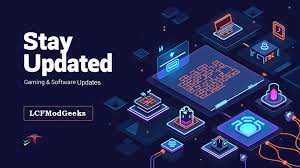“Software updates LCFModGeeks” has become a phrase people use when they’re searching for the latest patch notes, mod compatibility tips, and fixes around games and PC tools. It refers to a mix of community guides, blog posts, and how-to explainers that track updates for popular titles, utilities, and mods. These roundups often appear quickly after updates and can be helpful, but they also vary in quality. Some provide accurate, step-by-step instructions, while others are vague or risky to follow. To use them effectively, you need to know how to evaluate the information, protect your files, and apply updates without breaking your system or corrupting your save data. In this guide, you’ll learn what “LCFModGeeks-style” update posts usually mean, what benefits they bring, the risks involved, and how to build a safe updating routine that keeps your system secure, stable, and ready for both gaming and productivity.
What “LCFModGeeks” Usually Means Right Now
LCFModGeeks is not one official application. Instead, it acts as a label used by multiple blogs, forums, and community writers to describe a hub for gaming updates, modding news, and software tips. You’ll usually find quick patch summaries, compatibility notes for popular mods, and advice on related PC utilities. Think of it more as a content category than a single brand or product.

Key Takeaways
It’s not an official update manager but a way of grouping community-driven posts.
Expect overlap between patch notes, mods, and system tools.
The quality depends on the author; always verify details before acting.
The Good Stuff These Update Hubs Provide
When written carefully, LCFModGeeks-style posts can be genuinely useful.
Plain-English Patch Summaries – They explain what changed and why it matters.
Mod Compatibility Alerts – They highlight which mods need updates or temporary workarounds.
Step-by-Step Instructions – Some guides outline the exact order of updates to avoid conflicts.
Cross-Tool Tips – They may cover everything from game patches to drivers in one place.
The best posts connect official patch notes with community testing, helping you avoid mistakes while updating.
The Risks to Watch (and How to Mitigate Them)
Not every update guide is reliable. Some are vague, rushed, or lack important details.
Risks include:
Vague claims with no version numbers or release dates.
No references to official changelogs.
Overly broad promises like “one-click fix for everything.”
How to protect yourself:
Always verify version numbers.
Cross-check at least one detail with official or well-known sources.
Test updates in a sandbox profile before committing.
Keep backups of saves, mods, and configurations.
Be cautious with files labelled as “modded software” and scan them for security.
A Clean, Reliable Update Routine
Step 1: Prep & Backup
Back up your saves and config files.
Export mod manager load orders.
Step 2: Update Base Layers First
Install operating system security updates.
Refresh drivers and dependencies (GPU, DirectX, .NET, etc.).
Step 3: Update the Game and Mods
Let the game update fully.
Update your mod manager and frameworks like script extenders.
Update mods gradually, not all at once.
Step 4: Validate on a Test Profile
Run a clean profile with only core mods.
Slowly reintroduce mods in batches.
Step 5: Rollback Plan
Keep archives of prior versions.
Disable auto-updates until mods catch up.
How to Judge an Update Post at a Glance
Specificity – Does it mention exact versions and changelog items?
Reproducibility – Can you follow the steps yourself?
Scope Awareness – Does it explain mod loaders and frameworks clearly?
Safety Hygiene – Does it recommend backups and security steps?
A strong guide will score high on all four factors.
Update Playbooks by Platform
Windows PC
Delay updates for heavily modded games.
Prioritise GPU drivers.
Run integrity checks only after backups.
macOS
Minor updates are safe; delay major OS jumps if you use mods.
Use Time Machine before big updates.
Linux/Proton
Pin Proton versions per game.
Keep DXVK and VKD3D layers current.
Consoles
Limited control; rely on official updates only.
Mod Manager Smarts That Prevent Problems
Use profiles to test changes safely.
Keep notes on load order rules.
Rebuild caches after updates.
Update script extenders before mods.
Texture mods are safer; prioritise script-heavy ones for updates.
Security: Treat Modded Software as Untrusted
Run only files you can trace to a developer.
Scan all downloads with antivirus tools.
Avoid “unlocker” claims that bypass official systems.
Question any installer that requires full admin rights.
A Simple Weekly Routine
Pick a weekly check-in time.
Review OS updates, drivers, and your top games.
Read one LCFModGeeks-style roundup for patch context.
Update in order: base → frameworks → mods.
Test with a quick gameplay session.
Keep notes for future rollbacks.
Troubleshooting: Quick Fixes After a Bad Update
Crash at launch: Check script extender version.
Infinite loading: Disable newest mods first.
Broken textures: Reinstall texture packs.
New stutter: Revert the GPU driver.
Controller issues: Reset input profiles.
EEAT: How to Trust LCFModGeeks Content
Experience – Does the author show hands-on knowledge?
Expertise – Are they fluent in modding tools and terms?
Authoritativeness – Do other modders cite the guide?
Trust – Is there a clear update date and transparent advice?
Use this framework to separate high-quality guides from weak or unreliable ones.

Conclusion
“Software updates LCFModGeeks” is best seen as a type of community-driven update guide, not an official program. These posts can save you time by explaining patch changes, highlighting mod compatibility, and reminding you about system-level updates. But their quality varies. The most effective approach is to verify details, update in layers, and maintain a safety net of backups and rollbacks.
By following a weekly routine and applying EEAT principles—experience, expertise, authoritativeness, and trust—you’ll quickly separate helpful posts from risky ones. This way, you enjoy the benefits of updated features, smoother performance, and better security without the frustration of broken mods or corrupted saves. Treat LCFModGeeks-style updates as an extra resource: a supplement to official notes and trusted modding communities. With the right habits, they can make your update process faster, safer, and much less stressful.
Read Also: Whatutalkingboutwillis Gift Guide: Funny Retro Ideas
FAQs
Is LCFModGeeks an official updater?
No. It’s a term used by community blogs and posts about updates. It isn’t a single official tool.
Are LCFModGeeks’ update guides safe?
Yes, if they provide clear version numbers and steps. Always back up files first.
How do I update mods without breaking my game?
Update in layers: game first, then frameworks, then mods. Test in a clean profile before restoring your main one.
What if an update breaks my setup?
Pause updates, revert mods, or roll back your game build. Keep backups for quick recovery.
Does LCFModGeeks cover non-gaming software?
Yes. Many posts also cover drivers, utilities, and OS updates that affect gaming performance.










